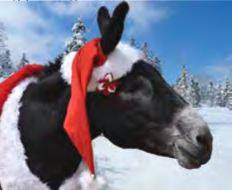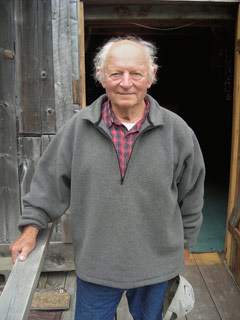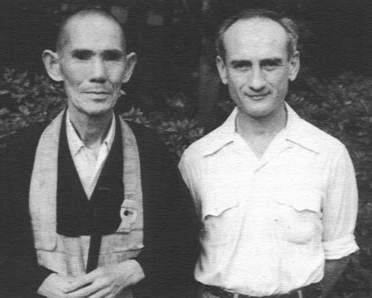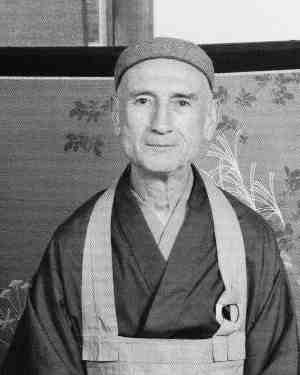SelfDefinition.Org
The Zen Master in America
Dressing the Donkey with Bells and Scarves
by Stuart Lachs

6. Walter Nowick and Philip Kapleau
Text
"To live in the realm of the buddha nature means to die as a small being, moment after moment." [93]
Another aspect of the post WWII movement of Zen to America that deserves mentioning is that of Americans who spent years practicing in Japan and who, upon returning to America, were believed to have "finished" their training and/or to have received Dharma transmission. The point is, as we have seen, that Dharma transmission does not actually insure that a person has any spiritual attainment, but because students believe this to be the case, it has great social currency.
Walter Nowick

Walter Nowick
(1926-2013)
The person with Dharma transmission, whether only assumed by his followers or actually so consecrated, concentrates within himself, all the symbolic capital of the Zen rhetoric concerning the unimaginable attainment of the enlightened Zen master. In this category are Walter Nowick, [Wikipedia] founder of Moonspring Hermitage Zen Center in Surry, Maine, [94] who studied under Zuigan Goto roshi, and Philip Kapleau [Wikipedia], [see below], founder of the Rochester Zen Center in Rochester N.Y., who studied under Soen roshi and Harada roshi, but primarily under Yasutani roshi, one of Harada's heirs.
The belief that Nowick had Dharma transmission was rumored as early as 1967 but became widely accepted with the publication of San Francisco Zen Center's fall, 1969 issue of the Windbell, the center's magazine. That issue contained a lineage chart showing the Rinzai and Harada (Sanbokyodan) lineages in America. It showed Nowick as a Dharma heir of Zuigan Goto roshi, though how this was determined is not clear. Naturally, this was widely believed by his students as well as most of the American Zen community. Nowick neither asserted nor denied the claim. He allowed his students to call him Walter, though a few called him sensei (J. teacher).
This form of American informality made him appear to have even greater attainment since he did not assume a title or honorific or appear attached to old and foreign religious institutional forms and roles. Nowick generously gave his students land on which to build their homes; however, due in part to his unseemly interference in his student's personal lives and his autocratic and increasingly erratic style of teaching, members started leaving the group. By the early 1980's, his rural group had shrunk from approximately forty-five members to about a dozen. An ex-member contacted Nowick's older Dharma brother in Japan, Soko Morinaga roshi, who supported the disaffected members by coming to America and holding teachings for them, running a weekend retreat, and generously providing financial support to one ex-member in need. [95]
He also wrote a letter to Nowick's students saying that though Walter was an outstanding student and widely loved and respected by the Japanese, he did not receive Dharma transmission from Goto roshi. [96] By the late 1980's Nowick had stopped teaching. The fractured group reorganized as Morgan Bay Zendo, a non-sectarian Buddhist meditation center without one specific teacher. It is led by a Board of Directors, some of whom are former students of Nowick. Unfortunately, this reformed group has recently run into trouble. One of its leading members, who was the head of the Board of Trustees, was accused of pedophilia with a number of teenage boys. [97]
Philip Kapleau

Yasutani and Kapleau
Kapleau's case is perhaps more complicated. In the late 1960's the Zen community believed that Kapleau and his teacher of roughly ten years, Yasutani roshi, had a disagreement during what proved to be Yasutani's last visit to Kapleau's Rochester Zen Center. Before leaving Rochester, Yasutani told Kapleau that he was severing their relationship. Upon returning to Japan, he put this in writing in a letter to Kapleau. Kapleau never publicly explained or even discussed the letter or the cause of the break. [98] However, according to Hugh Curran, who was head monk and living at the Rochester Center at the time, Kapleau privately revealed the cause of the break. [99] According to Curran, Yasutani initiated the break mainly because Kapleau was unwilling to attend more retreats in order to receive further Zen training. This was partially related to Kapleau's dislike of Eido Shimano, [see chapter 5] under whose hand, to some degree, he would be.

Philip Kapleau
Kapleau had studied with Yasutani for many years. Why would Kapleau risk severing his relationship with his teacher, after such a long and arguably arduous period? Could it be that Kapleau and Yasutani were operating under different standards, one Western and one Eastern? Was Kapleau, who was approximately sixty at the time, merely exercising his American sense of individual freedom and equality? Perhaps he felt that he was mature enough and knowledgeable enough that he did not need to be forced to study further under a young man, Eido Shimano, not to mention a young man with a questionable reputation with women. This refusal must have struck the conservative Yasutani [100] as heretical, a denial of a basic concept of Japanese culture—hierarchy and knowing your place in the order. If these suppositions are correct, what a perfect example of a clash of cultures.
In 1971, shortly after Dick Baker became Baker roshi by receiving Dharma transmission from his dying teacher and founder of the SFZC, Shunryu Suzuki roshi, Kapleau let it be known to his students that he, too, wanted to be called roshi. Clearly, this would increase his sanctity and authority. It would also enhance his stature in the free market place of Western Buddhism. So Philip Kapleau, sensei morphed into Kapleau roshi. It was widely believed in the Zen community that Kapleau had finished his training, though he had not received the formal ceremony of Dharma transmission because of the last minute break with Yasutani. In the following years, Kapleau enjoyed all the privileges and authority that go along with the title roshi.
In 1986 David Scates, a disgruntled ex-student of Kapleau's wrote a letter to Yatsutani's successor, Yamada roshi, complaining about Kapleau. Yamada roshi, then head of the entire Sanbokyodan sect, [101] knew Kapleau well, as Yamada had translated for him with Yasutani and given him koan interviews in Yasutani's absence.
Though to Yamada, Scates was a complete unknown, Yamada wrote a long letter airing strong grievances that he and his fellow translator Kabuto roshi had not gotten proper credit for their contribution to Kapleau's bestselling book Three Pillars of Zen and, perhaps even more explosive, that Kapleau had only finished one third of Yasutani's koan curriculum and was, therefore, definitely not a Dharma Heir.
Yamada sent a copy of the letter to Kapleau who wrote back defending his position by claiming that only he and Yatsutani roshi knew that he had completed most of the koan course. However, by this time, with Yatustani dead, this could be not be confirmed. At this time, Kapleau perhaps being cautious, never said exactly what he did and did not finish. Kapleau, though disputing what part of the course he did complete, was in fact admitting that he did not complete the entire koan course. However, if Kapleau had been more open at the time of the break, all of this would have been made clear. Kapleau also attacked the character of the disgruntled ex-student Scates, [102] besides maintaining that Yamada did not do as much work on the Three Pillars of Zen as he had claimed. [103]
The letter exchange is extremely interesting as it shows Yamada holding a strong animosity towards Kapleau for close to thirteen years that, under the slightest instigation from a complete stranger, he let pour out. Kapleau, for his part, kept hidden that he had not completed Yasutani's koan course, though he led people to believe he had. He also took the title roshi upon himself, perhaps to compete with Baker and Eido Shimano, gave Dharma transmission to others, though he did not have it himself, all the while claiming to be following the orthodox Zen way. In fact, Kapleau received only two certificates from Yasutani: one dated August 7, 1958 that "he passed the initial barrier" [Mu koan] and as such, is "granted qualification as a propagator/
In 1997 Ji'un Kubota roshi, Yamada's successor as head of the Sanbokyodan sect, answered an enquiry from a Polish Zen group asking about Kapleau's credentials. He replied that Kapleau did not finish his training, claiming that Kapleau's fame for the Three Pillars of Zen was undeserved because he [Kubota] and Yamada roshi had translated "all" of the work in the book. He added that Kapleau "was not able to read Japanese" and only made their translation "more understandable" to native English readers. He remarked that Kapleau was arrogant and proud and that he treated Yasutani "abusively and impolitely." He then proclaimed, "He [Kapleau] is no more a Zen man. His teaching is no more Buddhist Zen but only his own philosophy." [105]
Both Nowick and Kapleau misled their students and the wider Zen community by encouraging them to believe that they had completed their training. Nowick, when confronted by a former student with Morinaga's letter, responded by saying that Morinaga should not have discussed his training. Kapleau, under different circumstances, also claimed that Yamada should not have discussed his training. In fact, what both did not like was having their real position, in terms of their training, made public.
Notes, part 6
[93] Crooked Cucumber, p.104.
[94] The author was a member of Moonspring Hermitage from 1970 to 1981. He held many positions of responsibility, including President of the Board of Trustees, leader of the meditation hall (jikijitsu), and instructing new members in meditation and others aspects of life at the Center.
[95] Morinaga roshi held these teachings at the home of Prof. Martin Colcott of Princeton University. Colcott's wife Akiko is Morinaga's niece. Colcott and Morinaga, now dead, had a long and close relationship. Colcott translated for Morinaga during his second visit to Nowick's group in the early 1970's. Morinaga made two visits to Maine, not only to instruct the group, but to instruct Nowick as well in how he wanted things done. On Morinaga's first visit, Prof. Luis O. Gomez of the University of Michigan translated. I believe Gomez was a student of Morinaga's at the time,
[96] The author has a copy of the letter.
[97] See "Community Concern: Blue Hill group confronts effects of sexual abuse through education, support for victims," Alicia Anstead, Bangor Daily News, March 28, 2007, p.1. A well balanced article is available at archive.bangordailynews.com
[98] At the time of the break, there was a rumor that it was caused by Kapleau wanting to chant the Heart Sutra in English, rather than in Japanese. Yasutani, according to this story, was strongly against this change, which led to misspoken words and the break. This explanation, however, was not widely accepted.
[99] Hugh Curran, in a private correspondence with the author, described the break and Kapleau's decision to use the honorific "roshi."
[100] Yasutani was extremely conservative and was described as a "fanatical militarist" as was his teacher, Harada roshi. Yasutani was against unions, wanted the universities as they were, "smashed one and all" and blamed world conflicts and wars on Western-style social sciences that enhance the idea of self. See Victoria, Brian, Zen At War, Weatherhill, 1997, pp. 167-168. Also see pp. 190-191.
[101] The Sanbokyodan sect of Zen was founded by Yasutani. Though it is perhaps the largest sect in the West, it is rather small in Japan.
[102] Hugh Curran maintains that Kapleau had a tendency to dismiss criticism by attacking the messenger.
[103] David Scates, the fellow who initiated the letter exchange, gave me copies of the letters. They were meant to be public, so any one interested can email me at [email protected] for a copy of the exchange.
[104] The author has photo copies of the two documents along with a translation by Brian Victoria, author of Zen At War. Any one interested in a copy can email me at the address in the above footnote.
[105] The author has a photo copy of the letter available to any one interested by emailing me at [email protected]